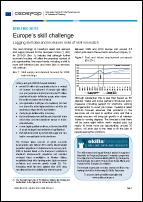Skills forecast reveals risks and opportunities in Europe’s labour market
Cedefop’s latest forecast on the demand and supply of skills shows that the European Union can expect a net increase in employment of 8 million new jobs between 2010 and 2020. Nearly ten times more jobs (around 75 million) will be generated to replace workers who leave the labour market.
But skill mismatches and, in some sectors, skill shortages raise risks for the European labour market and the competitiveness of the European economy.
 The need for higher qualifications continues to rise, but because of the crisis the immediate demand has slowed down. This has led many people to take jobs for which they are overqualified and increased the risks of mismatch.
The need for higher qualifications continues to rise, but because of the crisis the immediate demand has slowed down. This has led many people to take jobs for which they are overqualified and increased the risks of mismatch.
Cedefop’s Acting Director Christian Lettmayr cautions against drawing the wrong conclusions. Presenting the findings of the skills forecast at the European Economic and Social Committee today, he said: “Concerns over possible mismatches should not discourage people from seeking higher qualifications. A highly-qualified workforce is one of – if not the – most important factor for Europe’s competitiveness.”
Shortages persist despite high unemployment
While workers are affected by mismatches, some sectors face shortages. Too few people, for example, are studying science, technology, maths and engineering. These fields continue to be in high demand.
By 2020, about 40 % of young people will have a university degree or equivalent. But qualifications are not enough. In search of the right skills profile, more and more students are opting for upper-secondary, pre-tertiary and university-level vocational qualifications. In 2020, jobs requiring medium qualification levels will still outnumber those requiring high and low qualifications.
Winners and losers in the future job market
 The forecast finds that trends such as the shift to more skill-intensive jobs and towards services will continue, regardless of the effect of the crisis.
The forecast finds that trends such as the shift to more skill-intensive jobs and towards services will continue, regardless of the effect of the crisis.
Alena Zukersteinova of Cedefop’s skills team says: “What this forecast shows is that the real decline is in routine jobs - but these are not always low-skilled. Production-line jobs are obviously routine, but
Personal care services, however, which are considered low-skilled, are not routine, and demand for such jobs will continue to grow. Clerical jobs, on the other hand, are projected to suffer serious losses by 2020.”
About the project
In 2008, Cedefop published the first pan‑European forecast of skill demand, providing comprehensive medium‑term projections of employment and skill needs across Europe to 2015. A year later, it was complemented by the first medium‑term forecast of skill supply in Europe to 2020.
The present forecast - the second to combine data on the supply and demand of skills - takes intoaccount the effects of the crisis, and is the first to include indicators on future imbalances.
The forecast assumes that the Eurozone will stabilise and that a modest recovery will bring a return to job growthacross the EU.
Briefing note: Europe’s skill challenge
Available in English, German and French
On-line data and results from the Skills forecast
Download the press release as a PDF file
Contact:
Press Officer
Ioánna Nezi, tel. +30 2310 490186, E-Mail: [email protected]
Head of Communication, Information and Dissemination
Gerd Oskar Bausewein, tel. +30 2310 490288, E-Mail: [email protected]
About Cedefop
The European Centre for the Development of Vocational Training (Cedefop), an agency of the European Union based in Thessaloniki, Greece, supports European policy-making in the field of vocational education and training. www.cedefop.europa.eu
 Printer-friendly version
Printer-friendly version- Login to post comments
- 103 reads








